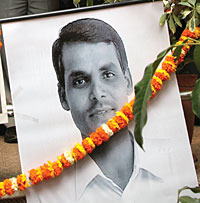 MIN RATNA BAJRACHARYA |
Considering the brutality of kidnappers in the national capital, crossborder kidnappers in this frontier town actually appear somewhat less vicious.
Mahesh Sharada was reportedly released after paying a hefty ransom in Thapathali. A businessman believed to have been kidnapped from Tinkune is still in captivity. There was the failed attempt to abduct a fourth grade student in Banasthali. Then the dismembered body of kidnapped student, Khyati Shrestha, was found this week in Kathmandu.
What gets reported in the media is only the tip of the iceberg. It's in private conversations that one gets to guage lawlessness and disorder has become. In some families, ready cash is often kept at home so that the attention aroused by sudden bank withdrawals can be avoided. Nobody goes to the police.
There are professional mediators here in Birganj whose main job is to maintain contact between kidnappers and the families of victims and earn a cut for safe release.
Biren Pradhan, the accused in the Khyati abduction and murder case, exhibited the callousness of an amateur. But people fear that the wide publicity given to the case may give ideas to future first-time abductors for copycat crimes. Ironically, the sadistic brutality of the murder case in Kathmandu has redeemed minor armed groups in Tarai who are reputed to treat hostages with due respect.
In the early 1980s, the nation's consciousness was shaken by the murder of school girls Namita and Sunita Bhandari and their friend Neera Parajuli. The triple murder of the schoolgirls remains a mystery to this day, although a royal cover up was suspected. The police closed the case during the reign of king Gyanendra.
The Bhandari sisters came from an elite Kathmandu family. Yet, the tragedy was soon forgotten. Surya Bahadur Sen Oli was the CDO of Kaski. He is now a Maoist, but still isn't spilling the beans.
In the process of enduring the pathologies of dictatorial regimes and brutal insurgencies, our collective conscience seems to have lost the ability to empathise with the victimised families and pursue a case to its logical conclusion. The public hue and cry tends to die down within a few days as everyone get back to their business.
Whoever now remembers Bara-based journalist Birendra Sah or indomitable freedom fighter Uma Singh? Yet, their killers swagger around as political activists, shouting slogans for civilian supremacy. Invented explanations that blame the victim are often offered to exonerate perpetrators of crime which the society meekly accepts before moving on.
The worst way to approach a murder case is to portray the killer as a psychotic.Yet that was just what the investigators did. Biren Pradhan was a compulsive gambler with a perverted mind. Declare him a deviant, and society can then sleep well with clear conscience. The criminals are exceptions, we tell ourselves.
Modern materialism, class differences, joblessness, the long-term effects of the war on society's psyche all combine to produce a tinderbox where even a small incident can trigger tragedies of unbearable proportions.
The communal dimensions of crime need to be played down to prevent a backlash. The Indian media appears to be stoking the fire of hatred by stressing Biren's Darjeeling origins.
But if he has indeed committed the crime, he should get harshest possible punishment. It is impunity, and the sight of the murderers wearing political cloaks walking freely, that has led to this crime wave.



